 Anyone who enjoyed Mario Kart on the Nintendo SNES back in the 90s will love MicroQuad by Viex Games.
Anyone who enjoyed Mario Kart on the Nintendo SNES back in the 90s will love MicroQuad by Viex Games.
Available on the Palm, Symbian Series 60 and Windows Mobile platforms, this is an old fashioned racing game that packs in an astonishing level of detail and playability.
We tested the game on the Palm Treo 650 and the graphics were fun, fast, slick and ran as smooth as a slippery thing in banana boots sliding over an oil slick.
The game
You certainly get a lot of bang for your buck, with a total of twenty different tracks/levels (that’s four unique tracks, each with five difficulty levels) and – apparently – some hidden unlockable tracks lurking within the game.
Gamers start off by taking part in the Baby Cup, and once enough games are won, they can progress through the Junior Cup, Pro Cup, Master Cup and eventually the Expert Cup.
 At the beginning of each game you can select any one of six different bikes, each offering different strengths and weaknesses (road, off road and grip).
At the beginning of each game you can select any one of six different bikes, each offering different strengths and weaknesses (road, off road and grip).
As well as navigating the ever-curving terrain at high speed, racers have to avoid oil slicks, sticky patches and missiles launched by competing karts.
Playing the game proved to be a whole load of fun, with the bright, colourful tracks, lively animation and attractive scenery making it something of an immersive, compelling experience.
Controlling the game
Playing the game via the Treo’s five-way controller was effortless, with the option to customise the placement and function of handset buttons via the game’s options menu – and there’s even a left-handed mode on offer!
We had no problems running the game off our 2 GB Sandisk SD card and the game proved to be rock-solid in use with no crashes (and we’ve been playing it a lot!).
 The game also offers an internet high score competition, a Bluetooth multiplayer option and a ‘Quick Race’ option if you fancy a quick blast around the tracks.
The game also offers an internet high score competition, a Bluetooth multiplayer option and a ‘Quick Race’ option if you fancy a quick blast around the tracks.
Conclusion
We liked this game. A lot.
It offers great value, exceptionally high quality graphics and a level of gameplay so addictive it can only be described as perilous.
The game’s tough enough to keep you coming back for more too, so you can expect a dramatic slump in productivity as soon as you install the game on your handset!
MicroQuad can be downloaded from Viex.org for just $14.95 (€12, £8).
Scores on the door: Features: 85%
Gameplay: 90%
Graphics: 90%
Value For Money: 95%
Overall: 90%
Compatibility:
Palm OS:
Tungsten E, T, T2, T3 and C
Zire 31 (low resolution), 71 and 72
Treo 600 (low resolution) and Treo 650
Sony Clie Series NX, NZ, TG, TH, TH and UX
Tapwave Zodiac 1 and 2
Pocket PC Windows Mobile 5.0
(tested on a Qtek 2020, a Qtek S100, a HP iPAQ 5550, a HP iPAQ 3950, a HP iPAQ 4700, a HP hx 2750, a Toshiba e800 and a Garmin iQue M5.)
Series60 Symbian
(tested on Nokia NGage, Nokia 6600, Nokia 7610 and Nokia 3650)
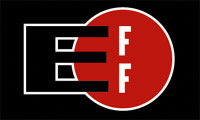 The BPI continued its policy of clamping down on illegal file sharing this week, when it contacted UK ISPs Cable and Wireless and Tiscali with requests to suspend 59 accounts.
The BPI continued its policy of clamping down on illegal file sharing this week, when it contacted UK ISPs Cable and Wireless and Tiscali with requests to suspend 59 accounts. In a statement on 12th July, the BPI stated “Early responses from both companies suggest that they will suspend accounts which have clearly been used for illegal filesharing” and indicated that it could supply detailed evidence on the other 16 Tiscali addresses. In an interview on More Four News Tiscali spokesman Richard Ayres said Tiscali’s message to the record industry is “Come to us, give us the details and we’ll absolutely work with you.” Which would seem to be in contradiction of Tiscali’s own letter, which also stated that “Tiscali does not intend to require its customers to enter into the undertakings proposed by you and, in any event, our initial view is that they are more restrictive than is reasonable or necessary.”
In a statement on 12th July, the BPI stated “Early responses from both companies suggest that they will suspend accounts which have clearly been used for illegal filesharing” and indicated that it could supply detailed evidence on the other 16 Tiscali addresses. In an interview on More Four News Tiscali spokesman Richard Ayres said Tiscali’s message to the record industry is “Come to us, give us the details and we’ll absolutely work with you.” Which would seem to be in contradiction of Tiscali’s own letter, which also stated that “Tiscali does not intend to require its customers to enter into the undertakings proposed by you and, in any event, our initial view is that they are more restrictive than is reasonable or necessary.” Coincidentally, the BPI action comes at the same time that the (US based)
Coincidentally, the BPI action comes at the same time that the (US based)  Microsoft have been fined by the European Commission for failing to comply with an anti-competitive ruling.
Microsoft have been fined by the European Commission for failing to comply with an anti-competitive ruling.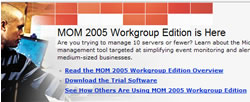 Competition Commissioner Neelie Kroes was quoted by Reuters as saying, “Microsoft has still not put an end to its illegal conduct. I have no alternative but to levy penalty payments for this continued non-compliance. No company is above the law.”
Competition Commissioner Neelie Kroes was quoted by Reuters as saying, “Microsoft has still not put an end to its illegal conduct. I have no alternative but to levy penalty payments for this continued non-compliance. No company is above the law.”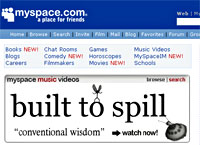 MySpace is now the most popular Website in the US, shimmying past traditional Internet big boys Yahoo and Google in the visitor share department, according to tracking firm Hitwise.
MySpace is now the most popular Website in the US, shimmying past traditional Internet big boys Yahoo and Google in the visitor share department, according to tracking firm Hitwise. “MySpace continues its meteoric rise, to now claim the number one spot for all Internet visits in the US,” roared Bill Tancer, general manager of Global Research at Hitwise.
“MySpace continues its meteoric rise, to now claim the number one spot for all Internet visits in the US,” roared Bill Tancer, general manager of Global Research at Hitwise. To the great disgruntlement of some, Rupert Murdoch’s News Corp bought MySpace for $580 million one year ago, and with MySpace clocking up a mighty 76 percent leap in traffic since April, no doubt he’ll be a happy chap.
To the great disgruntlement of some, Rupert Murdoch’s News Corp bought MySpace for $580 million one year ago, and with MySpace clocking up a mighty 76 percent leap in traffic since April, no doubt he’ll be a happy chap. Shaun Woodward (right) the MP famed for the twin disgraces of his defection from the Conservatives to Labour and a stint working with Esther Rantzen on That’s Life, is now Creative Industries minister and is busy singing the virtues of the UK’s Digital TV switchover plans.
Shaun Woodward (right) the MP famed for the twin disgraces of his defection from the Conservatives to Labour and a stint working with Esther Rantzen on That’s Life, is now Creative Industries minister and is busy singing the virtues of the UK’s Digital TV switchover plans. Digital UK had the current 98.5% coverage as a target and expects to meet this with additional coverage being by satellite, cable and broadband. Current figures indicate a rump of around 2% of refuseniks, those viewers content with a meagre 4 or 5 channels who see no value in multi-channel viewing, but expectations are this number will shrink as the digitisation spreads across the country like a warm front.
Digital UK had the current 98.5% coverage as a target and expects to meet this with additional coverage being by satellite, cable and broadband. Current figures indicate a rump of around 2% of refuseniks, those viewers content with a meagre 4 or 5 channels who see no value in multi-channel viewing, but expectations are this number will shrink as the digitisation spreads across the country like a warm front. T-Mobile is the latest UK mobile service provider to offer its mobile customers Windows Push Email.
T-Mobile is the latest UK mobile service provider to offer its mobile customers Windows Push Email. This certainly adds extra value to the T-Mobile package, which currently costs £17 a month, or £8.50 when added to Flext, Relax, or Business 1-Plan contracts.
This certainly adds extra value to the T-Mobile package, which currently costs £17 a month, or £8.50 when added to Flext, Relax, or Business 1-Plan contracts. For added security and convenience (in case you’re a bit forgetful/half-cut), the wipe feature lets owners decide how many incorrect logon attempts can be tried before the phone shuts up shop.
For added security and convenience (in case you’re a bit forgetful/half-cut), the wipe feature lets owners decide how many incorrect logon attempts can be tried before the phone shuts up shop. With credit card-crazy Brits leading at the front, Europeans are spending ever more money online, with the yearly total for 2006 on course to hit €100bn.
With credit card-crazy Brits leading at the front, Europeans are spending ever more money online, with the yearly total for 2006 on course to hit €100bn. So where’s the cash going?
So where’s the cash going?  The research was carried out by consultancy firm, Accent, after being commissioned by GNER will shock precisely no-one who has used a train on a regular basis. We’re sure that every laptop-toting rail-warrior will whole heartily agree with this one.
The research was carried out by consultancy firm, Accent, after being commissioned by GNER will shock precisely no-one who has used a train on a regular basis. We’re sure that every laptop-toting rail-warrior will whole heartily agree with this one. If there is a consistent WiFi connection, it may lead to a peculiar situation where it will be better to make calls on a VoIP service rather than rely on the very patchy cellular service that you get on-board trains.
If there is a consistent WiFi connection, it may lead to a peculiar situation where it will be better to make calls on a VoIP service rather than rely on the very patchy cellular service that you get on-board trains.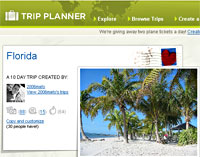 Now rolling out of its beta bed and arriving at the office for work is Yahoo’s new Trip Planner service, designed to let users plan their trips online and learn from fellow travellers experiences.
Now rolling out of its beta bed and arriving at the office for work is Yahoo’s new Trip Planner service, designed to let users plan their trips online and learn from fellow travellers experiences.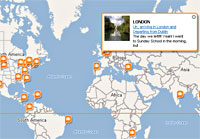 Web-addicted types are invited to whip out their laptops and PDAs while on holiday and share their experiences via blog items, reviews and photos (personally, we’d rather be on the beach or downing dubious cocktails in the bar than fiddling about on Yahoo’s site, but each to their own).
Web-addicted types are invited to whip out their laptops and PDAs while on holiday and share their experiences via blog items, reviews and photos (personally, we’d rather be on the beach or downing dubious cocktails in the bar than fiddling about on Yahoo’s site, but each to their own). “It is effectively a system to peruse the world for travel inspiration,” gushed Malcolmson.
“It is effectively a system to peruse the world for travel inspiration,” gushed Malcolmson.